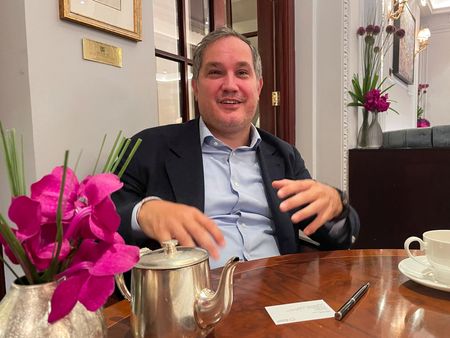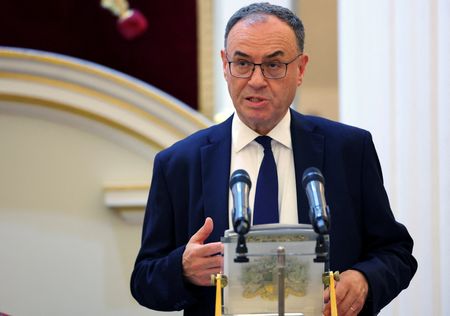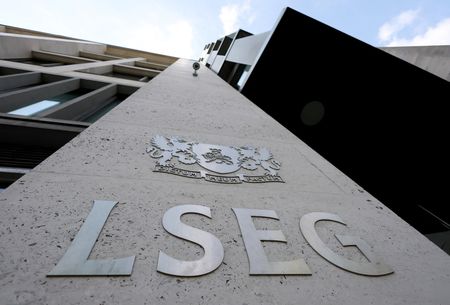By Marc Jones
LONDON (Reuters) -A combination of anaemic European growth and pre-election government spending could push Hungary’s budget deficit as high as 4.5% of GDP this year, the country’s economy minister has told Reuters.
Rising longer-term government debt costs have been causing worries in recent weeks, but Marton Nagy said Hungary would maintain the trust of both markets and the rating agencies now eyeing its investment grade credit score.
“This year, the official (deficit) figure what we have communicated to the market is 4.1%, but now I see that it will rather be between 4% to 4.5%, and around 4% next year,” Nagy said in London where he had been meeting investors.
The government recently slashed its economic growth forecast to 1% for the year from the 2.5% it had previously expected.
Nagy said it could come in fractionally lower still given Europe’s sluggishness, although even a rate of 0.7% wouldn’t be material for the budget given domestic consumption and VAT revenues were holding up.
Prime Minister Viktor Orban had hoped a stronger economy would help him secure another term in next year’s elections, when political analysts expect him to face the stiffest opposition challenge in over a decade.
He is looking to draw voters with large-scale tax cuts for families, cheap loans to first-time home buyers and pension rises due to higher-than-expected inflation, now seen averaging 4.7% this year.
Nagy said it would be “naive” not to expect a government to be increasing spending going into an election, although he knows there are limits, especially with its debt ratio near 75% of GDP and S&P, Moody’s and Fitch rating reviews in October, November and December respectively.
“We don’t want to risk the trust of investors and of course we don’t want to risk our credit rating. We are not stupid in that sense,” he said.
But “you have to prove to the people that you are the best choice, because you have competence and can improve their living standards.”
He said rating firms seemed a bit more “relaxed” since the country borrowed 3 billion euros in the market. S&P, which reviews Hungary on October 10, put a “negative outlook” on its BBB- rating back in April, meaning a cut would now demote the country into so-called ‘junk’ territory.
TIGHT RATES, STRONG CURRENCY
Back on the economy, he called Donald Trump’s trade tariffs a genius move and criticised Budapest’s long-term sparring partner, the European Commission, for failing to boost Europe’s economy.
Chinese EV giant BYD is set to open its long awaited factory in Hungary around the end of the year. Cars produced there could be far cheaper given they won’t be subject to the EU’s up to 45.3% tariffs.
He also backed Hungary’s central bank, where he used to be a policymaker, and which last month kept interest rates at the European Union’s joint-highest level of 6.5%.
Inflation remains a “public enemy” Nagy said. The government is continuing to cap the prices of some core household goods while the recent strength of the country’s currency, the forint, was also helping, he added.
“I would say that there is more of an advantage to a strong currency at the moment than a disadvantage,” he said, explaining that the cheapening of imports outweighed the limited extra drag on exporting firms.
(Additional reporting by Gergely Szakacs in Budapest; Editing by William Maclean)











